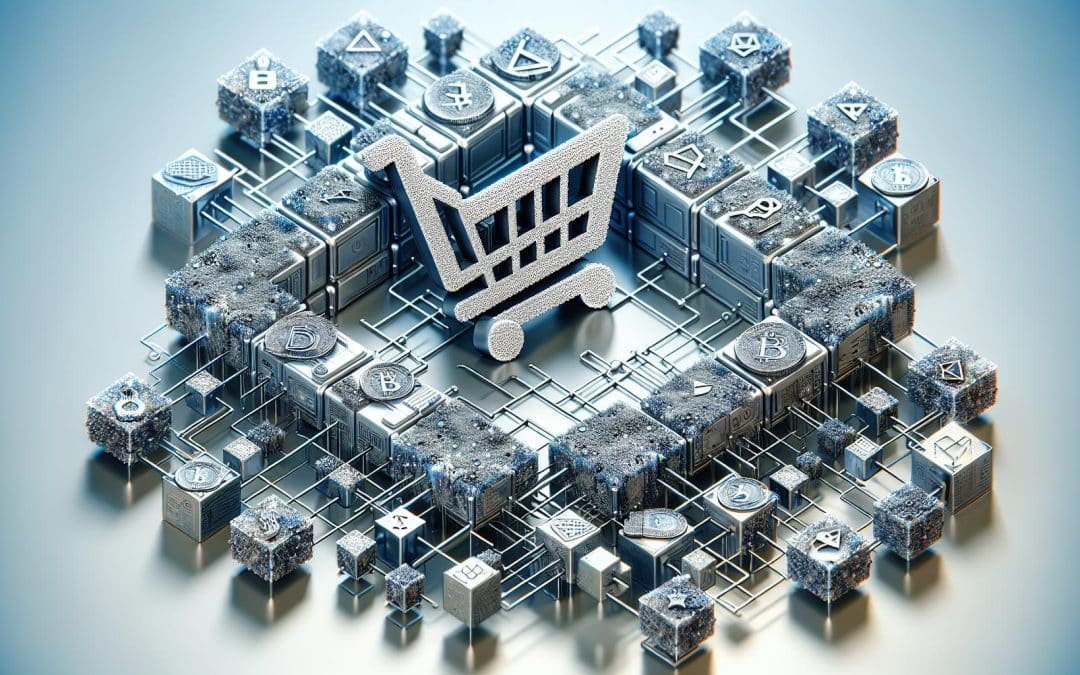In the fast-paced world of eCommerce, the integration of blockchain technology has revolutionized the way transactions are conducted online. Imagine a secure, transparent, and decentralized system where every digital exchange is recorded and verified across a network of computers. This is the power of blockchain distributed ledger eCommerce.
With blockchain as the backbone of online transactions, you can experience heightened security, reduced fraud, and increased trust between buyers and sellers. The immutability of the ledger ensures that every step of the transaction process is tamper-proof and traceable, providing a level of transparency never seen before in eCommerce.
Embracing blockchain distributed ledger technology in eCommerce opens up a world of possibilities for streamlined operations and enhanced customer experiences. Stay ahead of the curve and explore the transformative impact of blockchain on the future of online commerce.
Overview of Blockchain Technology in eCommerce
When it comes to eCommerce, the integration of blockchain technology has brought about a significant transformation in the way online transactions are conducted. By leveraging blockchain, eCommerce platforms can ensure enhanced security, transparency, and decentralization in their operations.
- Enhanced Security: Blockchain technology provides a secure environment for transactions by encrypting data and ensuring that each transaction is verified and recorded across a distributed network. This heightened security reduces the risk of fraud and unauthorized access.
- Transparency and Trust: With blockchain’s decentralized ledger system, every transaction is transparent and traceable. This transparency fosters trust between buyers and sellers as they can verify the authenticity of transactions without the need for intermediaries.
- Immutability and Traceability: The immutability of blockchain ledgers ensures that once a transaction is recorded, it cannot be altered or tampered with. This feature provides a tamper-proof record of all transactions, enhancing accountability and traceability.
- Streamlined Operations: By decentralizing processes and eliminating intermediaries, blockchain technology can streamline eCommerce operations. Smart contracts, powered by blockchain, can automate various tasks such as payment processing, order fulfillment, and supply chain management, leading to increased efficiency.
- Customer Experience: Embracing blockchain in eCommerce can significantly enhance the overall customer experience. Through secure and transparent transactions, customers can shop with confidence, knowing that their data is protected, transactions are secure, and products are authentic.
The integration of blockchain technology in eCommerce not only enhances security and transparency but also revolutionizes the way online transactions are conducted. By leveraging the benefits of blockchain, eCommerce businesses can build trust, streamline operations, and offer a seamless shopping experience to their customers.
Role of Distributed Ledger Technology in eCommerce

In the realm of eCommerce, the application of Distributed Ledger Technology (DLT), such as blockchain, plays a pivotal role in ensuring secure transactions and fostering trust between buyers and sellers. By leveraging blockchain in eCommerce processes, you can enhance transparency, streamline operations, and revolutionize the way online transactions are conducted.
- Enhanced Security with Immutable Records:
By adopting blockchain distributed ledgers, you ensure tamper-proof records that enhance accountability and traceability in eCommerce transactions. The encrypted nature of blockchain data provides a secure environment for storing sensitive transaction information. - Decentralization for Increased Trust:
Decentralized eCommerce platforms powered by blockchain technology reduce the reliance on central authorities, thereby fostering increased trust between transacting parties. This decentralized approach eliminates single points of failure and reduces the risk of fraudulent activities. - Efficiency through Smart Contracts:
Smart contracts, automated self-executing contracts with predefined rules, facilitate seamless transactions in eCommerce. By automating payment processing, order fulfillment, and other contractual obligations, blockchain-driven smart contracts enhance operational efficiency and minimize human error. - Transforming Customer Experience:
Integrating blockchain technology in eCommerce not only boosts security and transparency but also transforms the overall customer experience. Customers can enjoy secure and transparent shopping experiences, leading to increased trust and loyalty towards eCommerce platforms.
Distributed Ledger Technology, particularly blockchain, plays a fundamental role in shaping the future of eCommerce by enhancing security, transparency, and efficiency in online transactions. By embracing blockchain solutions in eCommerce operations, you can stay ahead of the curve and cater to the evolving demands of the digital marketplace.
Integration of Blockchain and Distributed Ledger in eCommerce
To integrate blockchain and distributed ledger technology in eCommerce, you’d need to adapt to the changing landscape of secure transactions online. Blockchain eCommerce solutions are revolutionizing the way online transactions are conducted by ensuring transparency, security, and trust between buyers and sellers.
Enhancing Transparency with Blockchain Technology
By incorporating blockchain technology, you’ll significantly enhance transparency in eCommerce operations. The distributed ledger system enables every transaction to be recorded and verified across a network of computers. This transparency demystifies the process of online transactions, providing a secure and traceable history of each transaction. This level of transparency is uniquely beneficial in ensuring the authenticity and integrity of eCommerce processes.
Boosting Security with Decentralized Platforms
When integrating blockchain technology into eCommerce platforms, you’re embracing decentralized systems that mitigate risks associated with centralized databases. Blockchain’s decentralized structure eliminates single points of failure, safeguarding transactions from malicious activities. By leveraging decentralized platforms, you’re ensuring that each transaction is verified and validated across multiple nodes, enhancing the security and reliability of eCommerce operations.
Implementing Smart Contracts for Efficiency
Smart contracts, powered by blockchain technology, automate various processes within eCommerce operations. These self-executing contracts enable automatic payment processing, order fulfillment, and other tasks, streamlining the overall eCommerce experience. By implementing smart contracts, you’re supercharging efficiency and reducing the need for manual intervention in transaction processes.
Transforming Customer Experience with Blockchain
Integrating blockchain technology in eCommerce not only enhances security and transparency but also revolutionizes the customer experience. Customers are provided with a secure and transparent environment for conducting online transactions, leading to increased trust and loyalty towards eCommerce platforms. This unparalleled level of trust is crucial in today’s digital world, where digital trust in online transactions is paramount.
As you explore the integration of blockchain and distributed ledger in eCommerce, consider the significant impact on security, transparency, and operational efficiency in online transactions. By embracing blockchain technology, you’re paving the way for a more secure, transparent, and customer-centric eCommerce environment.
Challenges and Limitations in Implementing Blockchain DLT in eCommerce
When integrating Blockchain Distributed Ledger Technology (DLT) in eCommerce, you may encounter some challenges and limitations that need to be addressed for successful implementation. Let’s explore key hurdles you might face:
Scalability Issues:
Scaling blockchain networks to meet the demands of a high-volume eCommerce environment can be a significant challenge. As transaction volumes increase, the capacity of the blockchain network to process transactions quickly and efficiently may be strained. Ensuring that the blockchain network can handle a large number of concurrent transactions without delays is essential for a seamless eCommerce experience.
Transaction Speed and Costs:
The speed of transactions and the associated costs are crucial factors in eCommerce operations. Blockchain transactions, especially in public networks, can sometimes be slower and more expensive compared to traditional payment methods. Balancing transaction speed with security and cost-effectiveness is essential to ensure that blockchain technology does not hinder the efficiency of eCommerce transactions.
Regulatory Compliance:
Navigating the regulatory landscape surrounding blockchain technology in eCommerce can present a challenge. Different jurisdictions have varying regulations regarding cryptocurrencies, smart contracts, and decentralized platforms. Ensuring compliance with these regulations while maintaining the benefits of blockchain technology can be complex. Adapting to regulatory changes and ensuring transparency in eCommerce transactions is crucial for long-term success.
Data Privacy and Security:
Maintaining data privacy and security is paramount in eCommerce transactions. While blockchain technology offers enhanced security through its decentralized and immutable nature, ensuring the privacy of sensitive customer information remains a priority. Implementing robust data protection measures and encryption techniques is essential to safeguard customer data and build trust in blockchain-powered eCommerce platforms.
Skill Gap and Education:
Blockchain technology is relatively new and complex, requiring specialized knowledge and skills for effective implementation. Addressing the skill gap by providing training and education to eCommerce professionals on blockchain principles and applications is essential. Investing in skill development and fostering a culture of continuous learning can help overcome this limitation and ensure successful integration of blockchain DLT in eCommerce.
By acknowledging and proactively addressing these challenges, you can navigate the complexities of implementing Blockchain Distributed Ledger Technology in eCommerce and unlock its full potential for secure and transparent online transactions.
Future Implications of Blockchain Distributed Ledger in eCommerce
Incorporating Blockchain Distributed Ledger technology in eCommerce could revolutionize the industry. Below are some areas where this technology could have significant implications:
Enhanced Transparency and Trust
By utilizing Blockchain Distributed Ledger in eCommerce transactions, you can enhance transparency by providing a secure and immutable record of all transactions. This transparency can help build trust between buyers and sellers as they can trace the entire transaction history on the decentralized ledger.
Improved Security and Privacy
Implementing Blockchain DLT ensures that sensitive customer data is securely stored and encrypted. This high level of security can mitigate the risks of data breaches and cyber threats, providing a safe environment for online transactions. Your information remains protected through cryptographic algorithms and decentralized data storage.
Streamlined Supply Chain Management
Integrating Blockchain in eCommerce supply chains can optimize processes, reduce delays, and enhance efficiency. Smart contracts powered by Blockchain technology can automate and validate various steps in the supply chain, ensuring transparency and accountability across the entire process. This streamlined approach can lead to faster delivery times and improved customer satisfaction.
Cost Reduction and Increased Efficiency
Blockchain Distributed Ledger can eliminate intermediaries in eCommerce transactions, reducing transaction costs in the process. By removing third-party fees and delays, you can conduct faster and more cost-effective transactions. Smart contracts can automate payment processes, cutting down on administrative expenses and enhancing operational efficiency.
Global Payment Solutions
With the integration of cryptocurrencies into eCommerce platforms, Blockchain Distributed Ledger technology allows for seamless cross-border transactions. By enabling cryptocurrency payments, you can cater to a broader global audience and overcome traditional payment barriers. This borderless payment solution can attract international customers and expand your market reach.
Market Expansion and Innovation
By leveraging Blockchain technology in eCommerce, you open up opportunities for innovation and market expansion. You can explore new business models, create decentralized marketplaces, and offer unique services to your customers. Embracing these innovations can set you apart in the competitive digital landscape and position your business for long-term success.
Harnessing the potential of Blockchain Distributed Ledger technology in eCommerce can lead to a more secure, transparent, and efficient online shopping experience. Embracing these future implications can propel your business towards sustainable growth and success in the rapidly evolving digital economy.
Conclusion
Incorporating Blockchain Distributed Ledger technology in eCommerce holds immense potential for revolutionizing online transactions. By addressing security concerns, enhancing transparency, and streamlining operations, blockchain offers a promising future for online businesses. Embracing this technology can pave the way for a more efficient and secure online shopping environment, fostering trust and innovation in the digital marketplace. As eCommerce continues to evolve, integrating Blockchain DLT can lead to sustainable growth and success, positioning businesses at the forefront of the digital economy. Stay informed about the latest developments in blockchain technology to stay ahead in the competitive eCommerce landscape.
Frequently Asked Questions
What is blockchain technology and how does it transform eCommerce?
Blockchain technology, specifically Distributed Ledger Technology (DLT), revolutionizes eCommerce by ensuring secure transactions, trust, and transparency between parties. It streamlines operations and enhances accountability in online transactions.
What challenges do businesses face in implementing blockchain DLT in eCommerce?
Businesses encounter hurdles such as scalability issues, transaction speed and costs, regulatory compliance, data privacy and security concerns, and a significant skill gap related to understanding blockchain technology.
What are the future implications of using Blockchain DLT in eCommerce?
Future implications include enhanced transparency and trust, improved security and privacy, streamlined supply chain management, cost reduction, global payment solutions, market expansion, and innovation for businesses in the digital economy.

